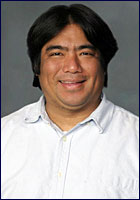Language
I promised a post on language a few weeks ago, and I'm finally getting around to it.
I had been learning Mandarin off-and-on on my own for years, but only really got serious about it a couple years ago. When I found I was to be the faculty visitor to Hong Kong in the Pepperdine Hong Kong program, I realized I should have studied Cantonese (the local language here). But I decided then to intensify my efforts in learning Mandarin, and learn a little Cantonese along the way.
The reasons were:
1. It would make it easier to keep the two separate, since anything I knew in Cantonese I would already know well in Mandarin.
2. It's much easier to find resources for learning Mandarin. In fact, some of the resources for learning Cantonese assume you have some Mandarin background.
3. The written language in all of China, including Hong Kong, is the same anyway, and often chooses Mandarin phraseology over Cantonese.
I started with characters, because some of it was already accessible to me since I knew Japanese which uses many of the same characters. There's
"Reading and Writing Chinese" by McNaughton and Ying that I like. For pronunciation I got
Pimsleur tapes, which I highly recommend. But for Cantonese they only have a level 1 course, which is enough to ask "where is Boundary street" but not enough to understand the answer you might get. I got a whole bunch of books, which was probably redundant, but I didn't know which were going to be most useful. At some point I got a tutor in Mandarin and later got a tutor in Cantonese--both Pepperdine students.
I would say that in Mandarin I can carry on conversations with someone if they speak slowly and are very patient with me, and stick with a range of topics where I know most of the vocabulary. In Cantonese I'm more at a
phrasebook level. My goal before leaving LA was to have enough Cantonese that immersion would actually help. People say that immersion is the best way to learn the language, but that only applies if you know some of the language--otherwise, you waste a lot of time trying to get an ear for the phonemes. It all sounds like gibberish if you don't know anything about the language at all. But if you have some background, you'll be able to say, "Okay, I don't understand what was just said, but they just used a word I've been hearing a lot in this context. I'd better look it up."
Actually, in Hong Kong, most of my interactions are in English. All the administrative staff at Hong Kong Baptist University and at Kowloon International Baptist Church speak excellent English. The same goes for most of the HKBU students. Same for the hotel staff where I'm living. The main places where Cantonese is useful is in restaurants (including on-campus), some shops (even here, the staff knows enough English to talk about their products), bus drivers, and cleaning staff. And my conversations in those contexts are fairly limited.
Reading signs is a different matter: even if they have translations in English, I can still try to read the characters. I can read about 70% of the characters I see, which is sometimes enough to figure out what's going on, and sometimes not. Often the main concept is hidden in a character I don't know, which is to be expected since I know the more basic characters.
Sometimes I've had an opportunity to have Cantonese spoken to me, and most of the time I'm not ready for it. Often, I'll hear the first word, and two seconds later, have an "aha" moment where I remember what that word means. By that time, of course, they have said many other words which I wasn't paying attention to because I was trying to figure out the first word. So I have to ask them to repeat it. Which may lead them to try saying it in a very different way, or try to find someone who can translate for them into English.
In Taiwan, they speak Mandarin, and even there I had trouble, though somewhat less (since I know Mandarin better). Still, the next thing they tried was to speak to me in Japanese.
I mentioned in a previous post that I surmised they could recognize someone of Japanese ancestry very easily, and wondered if in Hong Kong this would be true (it's not). I was even slightly peeved that they assumed I would speak Japanese. I'm not sure why. Because I do, sort of. Michele Langford at Pepperdine, a French-American, got me thinking about this kind of assumption. For instance, speaking to a dark-looking person in a service industry in Spanish, which she sees as racist. And she's probably right, though I argued with her just to be a devil's advocate.
I wondered about this as everyone spoke to me in Japanese in Taipei, and sometimes I would say in Mandarin that I spoke English, or that I was American. Sometimes I would just reply in Japanese because it was easier that way. A few times they said something in Mandarin which I didn't understand, then said it in Japanese which I wasn't ready for so I still didn't understand ("would you like a bag for that").
Once at the hotel restaurant, I saw a couple, the man being white and with an American-looking easy-going swagger, and the woman who was partly outside my line of sight but who had dark hair. The wait staff spoke to them in Japanese. This got me thinking that maybe it wasn't racist on their part. They just spoke to everyone in Japanese. After all, Japanese-speaking tourists outnumbered English-speaking tourists (from overhearing their conversations anyway) by at least 5 to 1.
Then I realized I was making the same assumption that these folks were English-speaking. In fact, though I could barely hear them, it sounded like they were speaking Japanese. Why can't a white guy be Japanese? Or at least have Japanese as his main language?
There was also a time when I ordered something, and the response, "Yi bai ba", I didn't understand at first. Then she said, "108" which I realized then was the price. I know the numbers, but for whatever reason, I wasn't thinking numbers when she said it. It doesn't help that in Chinese, there are many homonyms, and a sentence often ends in "ba" for a very different reason (in making suggestions, for instance).
Another time I wanted to see the Presidential Palace and went to a guard and asked in Mandarin where the entrance for tourists was (it wasn't obvious). He said, "Jintian guanmen le". I asked in Mandarin, "where's that?" He explained in English that he had said "today it's closed". I actually knew that phrase, but I didn't recognize it because I was expecting a location.
More on this later. We're going to Macau to activate one of the students' visas. This time I have a camera!
When they start calling
Okay, I've posted about my day, soapboxed about current events, and posted pictures. But I haven't earned the title of "blogger" until I've post a link to a site I find hilarious.
This one acknowledges that we often get called by telemarketers, and the telemarketer has a script, giving them an advantage in the conversation.
This site provides a counter-script in hopes of balancing the sides, while providing fun for everyone.
Someone let me know how it turns out. I haven't received any telemarketing calls yet in Hong Kong, and I suspect that if I do, they won't be in English.
Starting Madness
Classes started.
Pepperdine students hurriedly changed around their schedules. They did get to choose some at first, but without knowing when the classes would meet. They submitted these choices last March, I think, but it wasn't until mid-August that they knew which classes they actually would get, and when they would meet. And some of those times changed by the time the students arrived in Hong Kong. To make matters worse, they weren't allowed to make any changes to their schedule until the first day of classes, Monday.
It seems most students found a way to deal with this, but the range of courses that were actually available (and not already full) was limited, and not everyone was happy about the results.
Other problems:
1. The art classes are pretty far away. In fact, you need to take the subway (MTR) a few stops and then take a bus to get there. Some students struggled to investigate where it was today, and eventually they decided it was fine.
2. A student left her wallet on a bus. The bus eventually caught up with her and flagged her down! Another student left his wallet somewhere and a local student found it and returned it. I lost my octopus card (which I keep in my wallet), and I just bought another one. It seems that when you don't have a regular routine, it's easy to misplace things.
3. Students are supposed to get a stipend from Pepperdine for food using a "stored value card", which works like an ATM card. They are supposed to have received this before they left LA. That didn't happen. Then the cards were supposed to come into Pepperdine at some point last week. They didn't. I have no idea when they're supposed to come in. In the meantime I'm handing out cash, but I'm running into my maximum ATM withdrawal limits. This will hopefully be resolved using a Pepperdine credit card I have. We'll have to try tomorrow.
4. I can't print to the department printer. The printer that Pepperdine owns is fine, but at first it couldn't pick up the paper from the tray.
5. Not all the students in my classes have their books. Some didn't even receive the message that they were supposed to buy their books in LA until the day before they boarded the aircraft headed for Hong Kong. I'm xeroxing pages from the books in the meantime.
6. The AC in the seminar room is very efficient. In fact, maybe too efficient. With the AC on low, it gets very cold. If you turn it off, it gets warm and stuffy pretty quickly. When you turn it back on, it gets cold very quickly. The temperature knob on it is set to something pretty moderate, but clearly this is ignored.
7. Apparently there's no such thing as a "multiple entry visa" to mainland China anymore. Only single-entry and double-entry. We're not sure what happens if you want to go from Hong Kong to Tibet through mainland China, and return the same way. Maybe you use both of your entries on a single trip.
Still, there's a lot that's going well.
1. Everyone is adjusting very well. One student asked when he was supposed to be experiencing this "culture shock" thing. Another student felt that the sights he was wowed by when he first arrived now seem normal to him, and was kind of worried he would eventually take it all for granted. This is in contrast to a student from a different US university who felt overwhelmed by the change. At lunch, she said she was done with trying to "fit in" and just wanted to be American again. I think this difference is partly because our students are together, and had gotten to know each other in the previous Spring semester in the cultural awareness class. So if anything is overwhelming, they have a safe environment to return to. We had our group dinner and invited the student from the other university.
2. Our mishaps have ended happily. Yichieh got his student visa, finally, and we get to activate it in Macau this Saturday. Lost items got returned, as mentioned above. Once two people got separated from our group, and they were able to find their way home.
3. Many students (and I) are getting plugged into Kowloon International Baptist Church. The new college/youth pastor there (Maik, mentioned in an earlier post) is enthusiastic and gregarious, and has really reached out to us. So have several others in the KIBC staff: the music director Angie, and the Minister of Education Phil, and his wife Irene.
4. Students are connecting with each other, and with students from other universities. I think we have a pretty close-knit community, and yet everyone seems to have made friends outside Pepperdine as well, who we often include.
5. So far no major complaints about classes. We'll see how that holds up when midterms come, though.
6. So far no major issues with roommates. Again, maybe it's too early to tell.
7. The load has been fairly manageable so far for me. I've been having fun, and I have enough time to prepare for classes, even though the setup is very different from what I'm used to. The International Office at HKBU has been very helpful in meeting all of our needs.
I just auditioned for the college choir here. We'll be singing for the 50th anniversary of HKBU. We'll sing Beethoven's 9th Symphony. I'm really looking forward to that.
We're also going to Xi'an on 15-17 Sept. Some of us are going early, on the 14th. More on that later.
Happy birthday
We celebrated Nicole's 20th birthday a few days ago. I left at about 11 pm, but some of the others, including Nicole, stayed out until 6 am. They finally got to bed at 8 am. And found that suddenly, the corridors were full of noise. Noise of orientation for local students.
If you've ever been to an orientation for new students at a college, then you know that the college pays people to rile up the new students to make as much noise as they are physically capable of making. Apparently, the folks at HKBU are pretty good at their jobs.
Here's one event I took a picture of after 10 pm tonight:
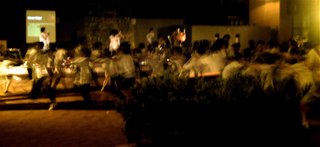
The main student dorm is divided into the north tower and the south tower. Here's the entrance to the south tower:
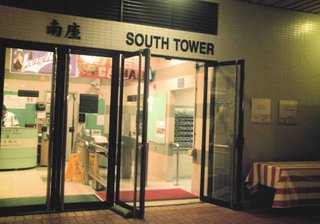
Note the turnstiles and the guard. I can't just go in without a specific invitation from a student and some paperwork. Students can get in (and out) using their student card, which has an RFID tag that they just hold up to a box, even if it's still in their wallet.
Each tower is about 20 stories high, and is divided into two halls each. These halls used to be divided by bottom half, top half, but because the bottom half halls were bummed about being less desirable (having no view), they started splitting it by odd numbered floors vs. even numbered floors. The sign to the right of the doors says what halls are in that tower.
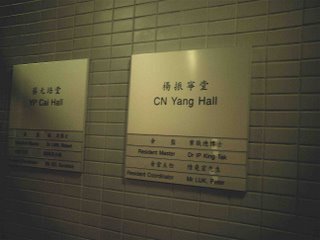
As you can see, one of them is named after C. N. Yang. Now Yang is a physicist, and Nobel laureate. I don't know what his connection is with HKBU. But the fact that they named a hall after a physicist is interesting.
Chen Ning Yang, together with Robert Mills, proposed in the 1950s a new way of thinking about the forces of nature. The history of physics might be viewed as a string of such advances in our thinking about the forces of nature. Newton found that gravity and the motion of the planets (and the moons around those planets) could be explained by a single force (the "gravitational force") that is a mysterious attraction that any two objects have toward each other, proportional to their masses and falling off with distance using the "inverse square law". This mysterious "action at a distance" bothered many people over the years, and it's possible to instead imagine that there is a "gravitational field" filling all of space, that interacts with objects. Objects increase the gravitational field, and they also get pushed around by it.
It turns out that a very similar description also works with electricity and magnetism, and the work of Faraday, Ampere, Maxwell, and others in the 19th century showed that electricity and magnetism were fundamentally linked into a single electromagnetic force, with an electromagnetic field filling all of space. This field was found to have a real existence when it was realized that you could generate waves in this field. These waves are exactly what we call "light".
In the very beginning of the 20th century Einstein discovers relativity, and one of the developments in this theory is that gravitation is not a mysterious action at a distance, nor is it a field filling all of space, but rather, it is the result of curved space-time. Trajectories get bent not because of a force, but because they're travelling straight in a curved space-time. One way of thinking of curvature is to imagine the surface of the earth. Start at the north pole, and point your hand in the direction of the prime meridian. If you walk along the prime meridian, your hand will continue to point south. Stop when you reach the equator. Now move west until you reach 90 degrees west. If you still try to keep your hand pointed in the same direction relative to your movement, you must be pointing to your left, which is also south. Now walk north until you reach the north pole. All throughout, keep your hand pointed in the same direction relative to your movement. This means pointing behind you, which is awkward but possible. When you reach the north pole, you are pointing in a different direction from where you started. This feature is known as anholonomy, and is only possible because there is a symmetry, that is, rotation of the sphere around any point on it still results in the same sphere.
The mathematician Hermann Weyl came up with a modification of this idea where lengths changed too, and this seemed to explain electromagnetism! But this theory (called "gauge theory") had physical problems: all the hydrogen atoms we observe are the same size, but if Weyl were right, you'd expect after some amount of moving around, some would get bigger or smaller. The physicist Erwin Schrödinger came up with a way of turning Weyl's idea around, positing an extra rotation of some internal unseen phase, instead of a rescaling, and this worked very well.
In the 1950s, Yang and Mills found a way to do this with more general kinds of symmetries (these are called "non-abelian gauge theories") and this turned out to be the perfect tool to understand the remaining forces of nature: the weak and strong nuclear forces. In fact, it was through this route that the electromagnetic and the weak nuclear forces were unified. The strong force can be pushed into this as well. In fact, the only one left is gravity, the one that started this whole thing, but the problem seems to be trying to make it quantum mechanical without getting "infinity" as the answer to reasonable questions.
I say all this because I find this development really cool. It's an example of an inherently beautiful and elegant idea turning out to be useful in understanding nature. It's perhaps evidence that God is a mathematician at heart (an idea that seems to be prevalent among many who have studied the subject).
And I bring this up to say that C. N. Yang is no random dude who hung out at HKBU and decided to give money one day. He's one of the people who really changed how we look at the universe. And HKBU named a hall after him.
The United States has its share of major discoverers and thinkers, at least in the last 60 years. But we don't honor them. The vast majority of people on the street in the US could not name a single living mathematician or physicist or philosopher or poet. We know about Bill Gates, Warren Buffett, Michael Eisner, Steve Forbes. It's even more likely this random person would know Paris Hilton. We know about rich people. We know about famous athletes or pop singers.
I'm told in China, many people on the street know about the mathematician S. T. Yau, for instance. And though he's Chinese, he actually teaches in the US (at Harvard). I'll have to ask around to see if Hong Kongers also know about him.
China has a long history of respect for learning. Since the time of Confucius (around 600 BC, I think?) doing well on examinations on fundamental knowledge was the path of success: people in low classes could be promoted to the highest levels of government based on their knowledge and their ability to demonstrate that knowledge on tests.
In the US, education was valued but only for very utilitarian ends. One advanced by getting money, and perhaps education could be used for that aim. We've always been fairly practical, and in fact, our egalitarianism may have worked against intellectualism. The concept of knowledge for its own sake has not generally been respected in the US.
This could explain why China can be responsible for so many developments in the past 50 years, even during times when the government did not support education (except for party indoctrination) and repressed intellectuals. That, given the level of severe poverty that sometimes characterized those years. The US did produce a lot of these advances in knowledge-for-its-own-sake, but not when compared to the amount of GDP that was available to invest in these developments, or the fraction of the population that was well-off enough. Especially if you discount those who were born outside the US.
It seems that though the respect for abstract learning is still here in Hong Kong, the most common major around HKBU now is business (as it is at Pepperdine). And many students here are interested in just being able to use their education to land them a job. Jie, who came with me to meet the Pepperdine students at the airport, is a physics major, living in Yang hall, as it turns out, and he finds the trend toward education-for-vocation disturbing (he's from Xi'an on the mainland). Lewis, who met us at the airport, is a humanities major and local to Hong Kong, and he bemoans the Chinese (and Hong Kongers in particular) losing their cultural heritage in pursuit of modernity. Is it Hong Kong, or is it the direction of China in recent years?
Here are the new students of Yang Hall, at a group dinner. Note their shirts.
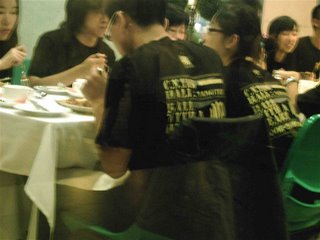
Apparently, someone from Yang Hall is a "Yangster" and their theme this year is "Hall With A Heart".
The grouping into four halls may be Harry Potter-esque, but take a look at their welcome dinner, with everyone wearing academic robes. As Pepperdine students came by (we were meeting near there) at least three people made the same comment about Harry Potter. But I think this is just a general British academic tradition.
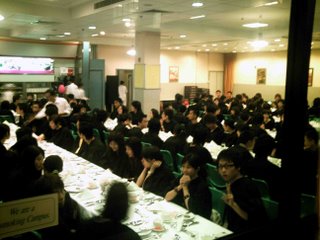
At least one student here is aware he's a part of a photo op. See him?
Here's another orientation shot, this time as people are learning the song "happy birthday":
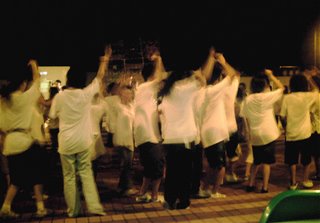
They're singing in Cantonese, then in English, then repeating, with dance moves. The tune is "Happy Birthday" (sounding a bit like "Happy Barthday") but a bit jazzed up and to no one in particular.
Happy Birthday... To! You! (clap) (clap)
Happy Birthday... To! You! (clap) (clap)
Happy Birthday, Happy birthday,
Happy Birthday... To! You! (clap) (clap)
Happy Birthday, Nicole!






